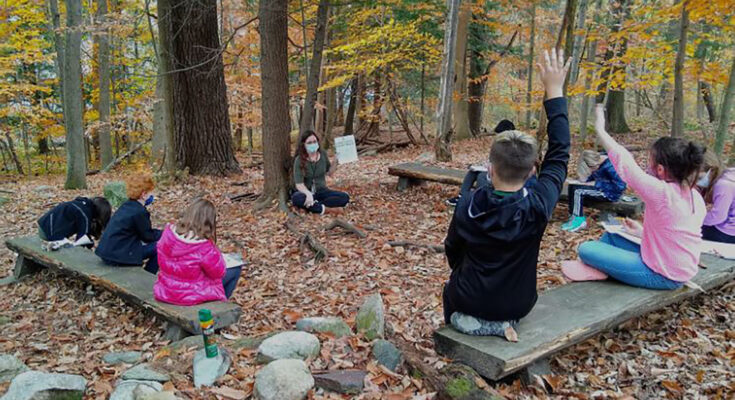Introduction
Forest schools have become increasingly popular as educators and parents recognize the benefits of outdoor learning and the importance of connecting children with nature. This guide provides ten engaging and inspiring forest school activities and outdoor learning ideas to help owners enhance their programs and offer fresh, exciting activities for children. From building dens to embracing mindfulness, these activities are designed to cultivate creativity, teamwork, and resilience while fostering a love for the environment.
Den Building
Den building is a classic forest school activity that encourages teamwork, problem-solving, and creativity. In this activity, children use natural materials such as sticks, leaves, and logs to construct their own shelters. Encourage children to work together, considering different shapes and designs for their dens. This activity helps develop motor skills, spatial awareness, and a sense of accomplishment.
Benefits: Improved teamwork, creativity, problem-solving, and motor skills.
Tips and Tricks: Provide guidance on safe construction techniques and ensure children have access to a variety of materials. Consider choosing a woodland area, using tarpaulins or ropes for added stability.
Suitable Age Range: KS1 and KS2 (ages 5-11)
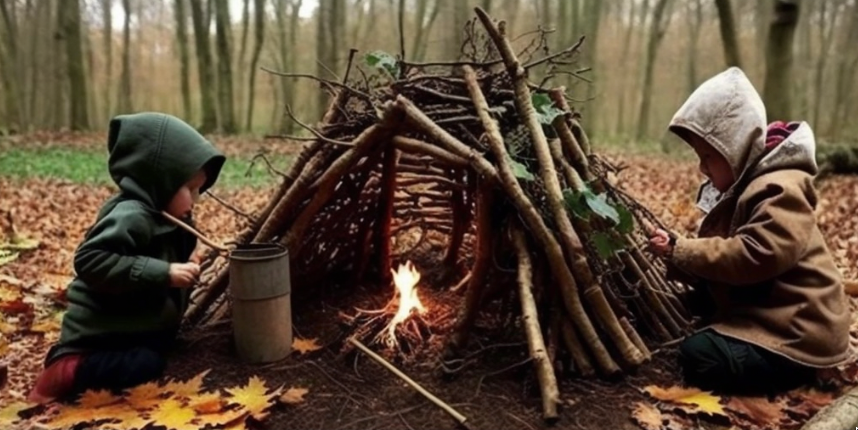
Nature Art
Nature art allows children to express their creativity using materials found in the forest. Provide children with a variety of natural objects such as leaves, sticks, pinecones, and stones, and encourage them to create their own masterpieces. This activity can be done individually or in groups, with children working together to create large-scale collaborative art pieces.
Benefits: Enhanced creativity, fine motor skills, craft skills and appreciation for nature’s beauty.
Tips and Tricks: Encourage children to think about color, texture, and patterns when creating their art. Consider using biodegradable string or clay to hold elements together.
Suitable Age Range: Toddlers, KS1, and KS2 (ages 2-11)
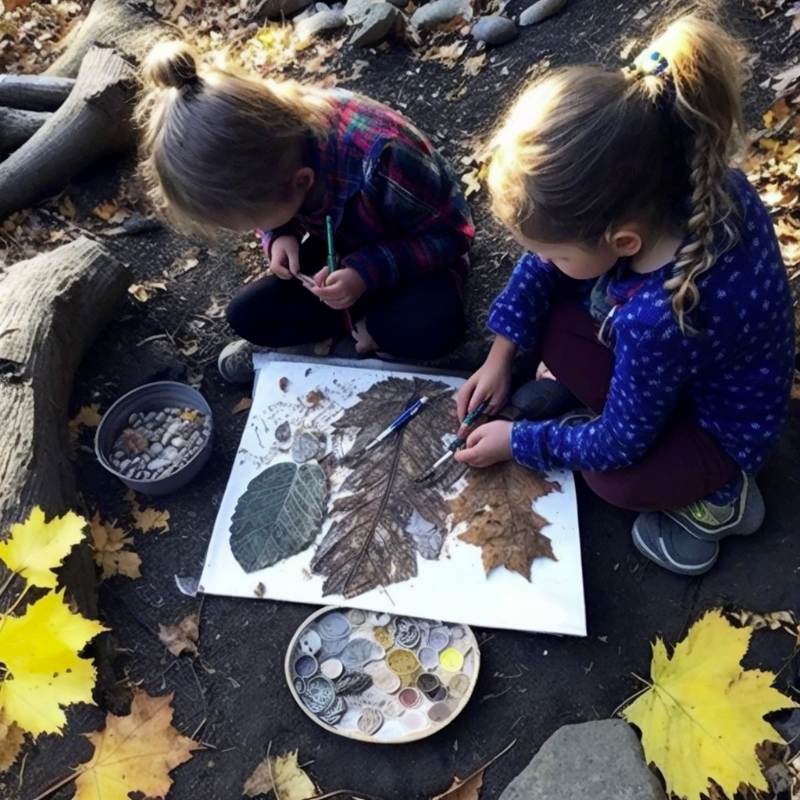
Forest Scavenger Hunt
A forest scavenger hunt is a fun and engaging way to help children explore and learn about their natural environment. Create a list of objects or clues for children to find, such as different types of leaves, insects, or bird nests. This activity promotes observation skills, teamwork, and an understanding of the forest ecosystem.
Benefits: Improved observation skills, teamwork, and ecological awareness.
Tips and Tricks: Tailor the scavenger hunt to the specific forest environment, and adapt the difficulty level based on the age and ability of the children.
Suitable Age Range: KS1 and KS2 (ages 5-11)
Mud Kitchen
A mud kitchen is an outdoor play area where children can mix, pour, and explore with mud, water, and other natural materials. Set up a designated area with pots, pans, and utensils, and encourage children to create their own mud concoctions. This activity promotes sensory exploration, imaginative play, and an understanding of natural materials.
Benefits: Enhanced sensory exploration, imagination, and understanding of natural materials.
Tips and Tricks: Provide a variety of containers and utensils for children to use, and ensure the mud kitchen is located in a safe and suitable area.
Suitable Age Range: Toddlers and KS1 (ages 2-7)
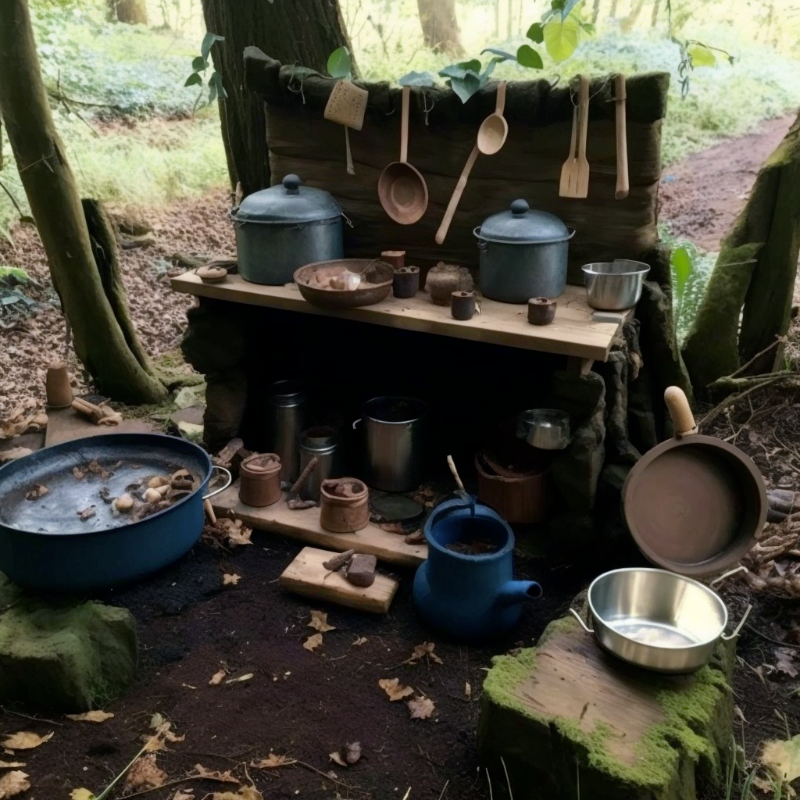
Wildlife Observation
Wildlife observation teaches children about the animals that inhabit the forest and their behaviors. Encourage children to quietly observe animals from a safe distance, using binoculars if available. Discuss the animals’ habitats, diets, and roles within the forest ecosystem.
Benefits: Increased understanding of wildlife and ecological awareness.
Tips and Tricks: Create a wildlife observation log for children to record their sightings and observations. Teach children about the importance of not disturbing animals and their habitats.
Suitable Age Range: KS1 and KS2 (ages 5-11)
Storytelling
Storytelling is a powerful way to engage children’s imaginations and foster a love for nature. Share stories related to the forest, its inhabitants, and folklore. Encourage children to create their own stories inspired by their surroundings and experiences in the forest.
Benefits: Enhanced imagination, listening skills, and appreciation for the natural world.
Tips and Tricks: Use props, such as puppets or found objects, to bring stories to life. Encourage children to act out their stories or create illustrations to accompany their narratives.
Suitable Age Range: Toddlers, KS1, and KS2 (ages 2-11)
Plant Identification and Gardening
Teaching children about plant identification and gardening fosters a deeper connection with nature and an understanding of the forest ecosystem. Introduce children to common plants, trees, and flowers found in the forest, discussing their uses and importance. Create a small garden area where children can plant seeds, tend to plants, and observe the growth process.
Benefits: Increased ecological awareness, gardening skills, and sense of responsibility.
Tips and Tricks: Choose plants that are native to the area and suitable for the forest environment. Provide children with gardening tools and gloves for safety.
Suitable Age Range: KS1 and KS2 (ages 5-11)
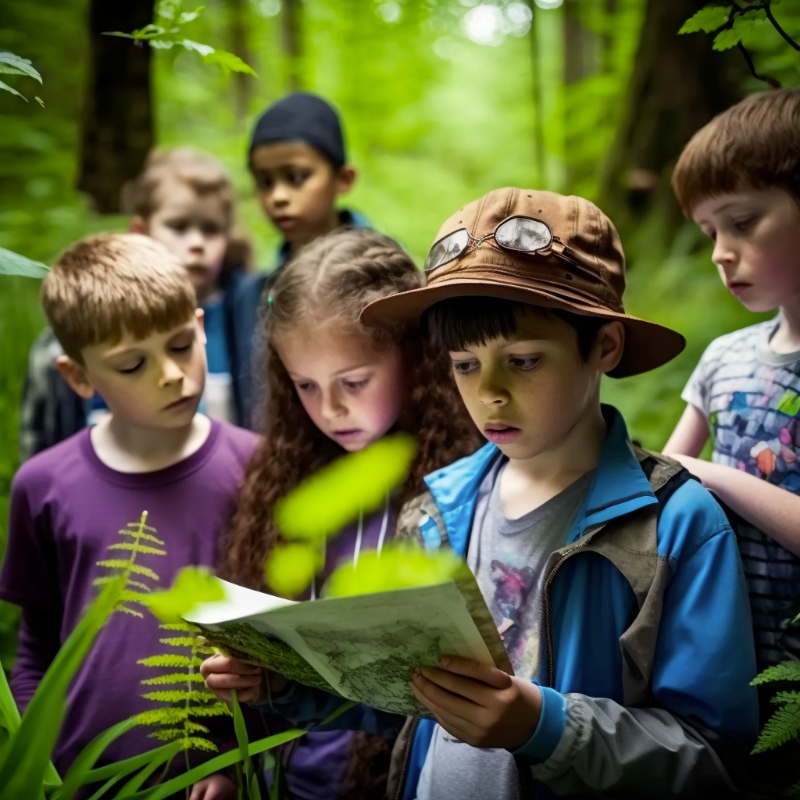
Forest Mindfulness and Yoga
Incorporating mindfulness and yoga into forest school programs encourage children to develop self-awareness, focus, and relaxation techniques. Guide children through simple yoga poses and breathing exercises, drawing attention to the sounds and sensations of the forest. Encourage children to reflect on their experiences and emotions.
Benefits: Improved self-awareness, focus, and emotional regulation.
Tips and Tricks: Choose age-appropriate yoga poses and mindfulness exercises. Encourage children to find a comfortable and quiet spot in the forest for their practice.
Suitable Age Range: KS1 and KS2 (ages 5-11)

Fire Building and Cooking
Fire building and cooking are valuable skills that can be taught in a safe and controlled environment. Teach children how to safely build and maintain a fire, emphasizing fire safety and responsible practices. Once the fire is established, engage children in outdoor cooking activities, such as roasting marshmallows or preparing simple meals.
Benefits: Development of practical life skills, fire safety awareness, and teamwork.
Tips and Tricks: Always supervise children closely during fire building and cooking activities. Ensure that a designated fire pit or area is used, and have water or sand available to extinguish the fire.
Suitable Age Range: KS2 (ages 7-11; younger children can participate with close supervision and age-appropriate tasks)

Nature Journaling
Nature journaling encourages children to observe, reflect, and document their experiences in the forest. Provide children with journals and drawing materials, guiding them to record their observations, thoughts, and feelings about the natural world. This activity promotes observation skills, creativity, and emotional expression.
Benefits: Improved observation skills, creativity, and emotional expression.
Tips and Tricks: Encourage children to use a combination of writing, drawing, and collage to document their experiences. Share journal entries as a group to promote discussion and learning.
Suitable Age Range: KS1 and KS2 (ages 5-11)
Conclusion: Forest School Ideas
Incorporating these engaging forest school ideas into your program will give each child more inspiration to connect with nature, but also help them develop valuable life skills in early years, such as teamwork, problem-solving, and creativity. By offering a diverse range of activities, children can explore, learn, and grow in a nurturing and stimulating environment. Embrace the power of outdoor learning and create unforgettable experiences that will shape the minds and hearts of the next generation.
Other resources
- After school club activity ideas: Other after school club ideas
- Benefits of arts and crafts: Blog post on the benefits of arts and crafts
- Forest school activities Woodland Trust: Resource pack for outdoor learning activities KS1 and KS2
- Forest school booking system: A fully customizable, easy-to-use online booking system for forest school owners who want to reduce admin work and automate the booking process
